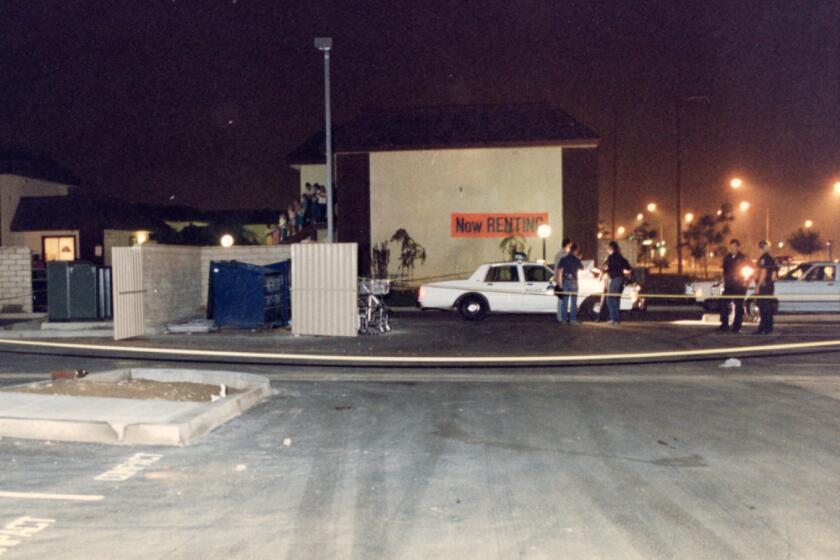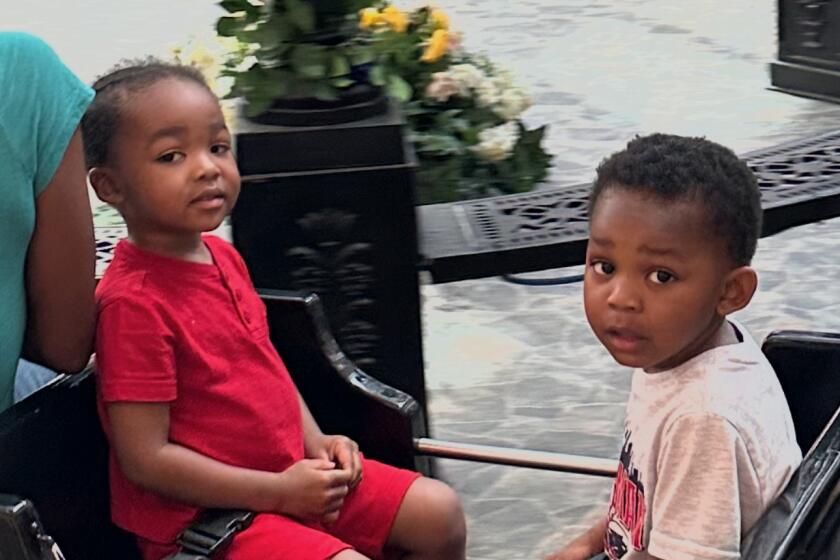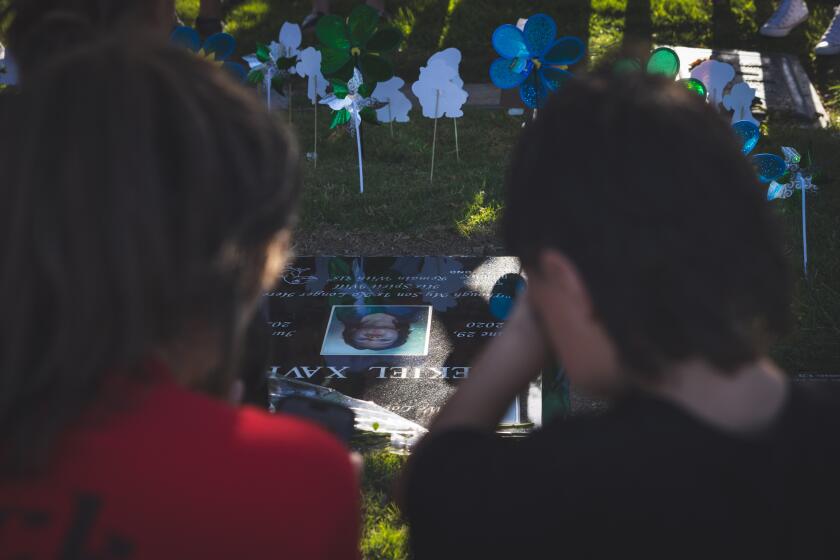L.A. man spent a decade in prison for ‘shaken baby syndrome’ death. Was it based on faulty evidence?

- Share via
There was no evidence of a crime, no witnesses, no sounds of an angry scream or a violent thud, but 3-year-old Isiah Meza was dead and his mother’s boyfriend, Jose Olivares, was the last person with him.
Olivares told police he’d stepped into the bathroom for about five minutes that day on Feb. 14, 2011. Isiah was playing with his toys and jumping on the bed. When Olivares walked out, Isiah was on the ground, crying and acting odd.
Doctors who treated Isiah at the hospital for three days, and later — after he died — examined his body, told law enforcement the injuries suffered by the boy — retinal damage, severe hemorrhage and swelling in the brain — could only be caused by someone violently shaking the child, a medical phenomenon called shaken baby syndrome.
After a 16-day trial in 2014, Olivares was convicted of assault on a child under 8 years old resulting in death, and sentenced to 25 years to life.
Ten years later, a Los Angeles County judge vacated Olivares’ conviction on Sept. 19 after attorneys for the 39-year-old man argued that new evidence suggests his prosecution was based on medical testimony that is now outdated and wrong. For years, medical experts believed injuries such as those suffered by Isiah could be attributed only to shaken baby syndrome, or SBS, but new research suggests a fall from a short distance — for instance, tumbling off a bed — could cause the same injuries.
On Wednesday, Olivares was released on a $100,000 bond.
“The facts always showed that Mr. Olivares was innocent but the medicine needed time to catch up and prove it,” said Lauryn Barbosa Findley, a lawyer with the Northern California Innocence Project who represents Olivares. “Mr. Olivares’ case is both extraordinarily unique and tragically common because faulty medical testimony has been used for too long to convict far too many loving parents and caretakers.”
The mother of a newborn found dead in a Riverside dumpster 37 years ago was arrested this week after a breakthrough in the cold case due to DNA evidence.
The latest medical findings have cast a new critical eye on hundreds of SBS convictions in California and across the country — cases in which attorneys say parents and caregivers might have been falsely accused and wrongly convicted of killing children in their care.
But Olivares’ legal troubles still loom.
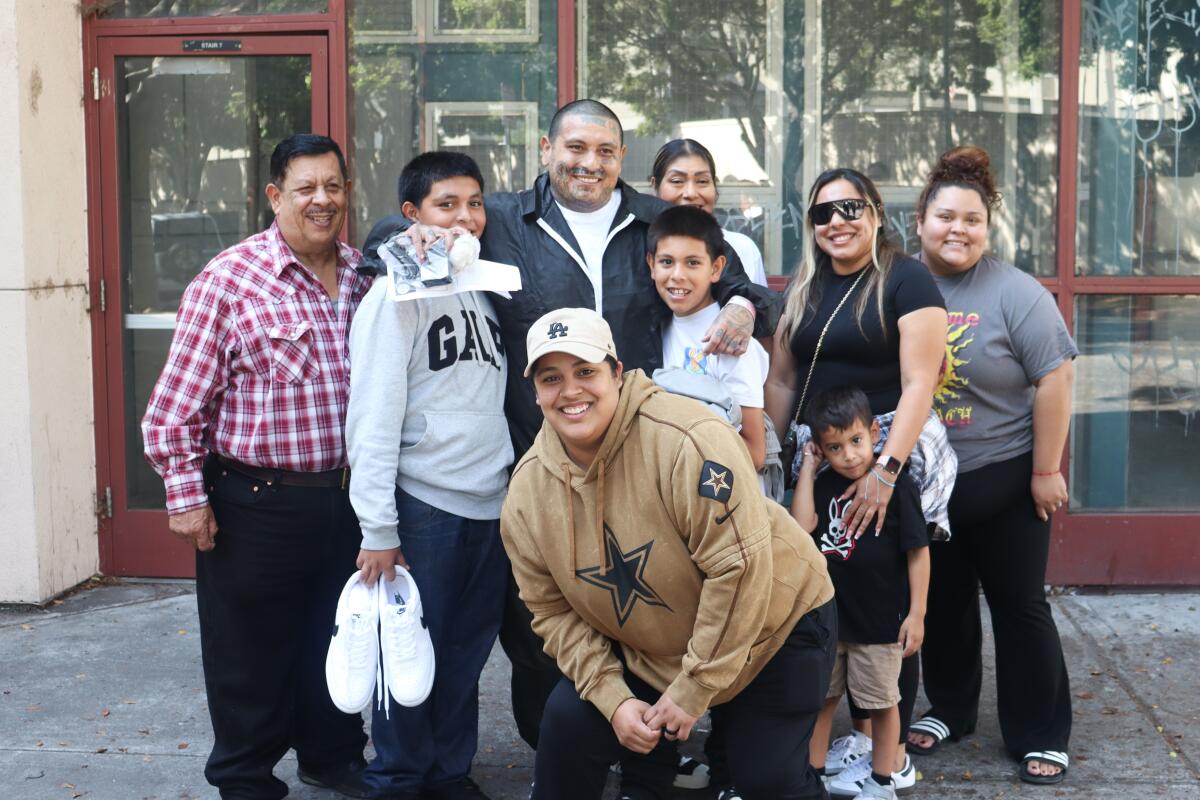
In court filings, prosecutors note that one of the doctors who testified in the trial, Donald Minckler, changed his opinion from his prior testimony, and agreed with defense attorneys that a habeas corpus motion met legal standards.
But prosecutors opposed dropping all of the charges outright, arguing that four other doctors who had testified in the trial believed Isiah’s death “was not accidental.”
Olivares is set to return to court Oct. 31 for a pretrial hearing.
Prosecutors presented five medical experts, who testified Isiah’s injuries could only be caused by SBS and could not have been a result of a fall from a bed.
The conviction came despite no past reports of abuse and no visible signs on Isiah’s body of bruising. No one testified that Olivares had lost his temper with the young boy that day or before.
Hours after Isiah was taken to a hospital, Los Angeles police responded. One of the attending physicians, Dr. Barry Markovitz, told an officer that Isiah’s injuries — retinal damage, severe hemorrhage and swelling in the brain — were “inconsistent” with falling off a bed.
“Those injuries could not be sustained just by a child falling off the bed,” the doctor told the officer, according to court filings.
Olivares, who had been dating Isiah’s mother for about a year, had no history of abuse, his attorneys argue. Three other adults who were in the house when Isiah was hurt said they did not hear yelling, hitting or signs that Olivares had been angry, or that Isiah had been fussy. Isiah’s small, 40-pound body also showed no other signs of violence, no bruises or marks on his arms or legs, according to his attorneys.
The family of 3-year-old twins who died of suspected fentanyl exposure is in shock. Relatives said they had no idea the boys’ mother used the opioid.
Relatives testified that Olivares “was a loving gentle father and father figure who had no history of abuse and would never have intentionally harmed Isiah,” according to court records.
But prosecutors in the trial pointed to the injuries and the medical opinion of the time.
“This case is really simple,” prosecutors told jurors in their closing statement, according to court filings. “You either believe that Isiah fell from 18 inches while jumping, which the defense would have us believe, or he suffered violent abusive head trauma at the hands of this defendant who was supposed to take care of him but instead killed him.”
The American Academy of Pediatrics and the National Assn. of Medical Examiners has supported the medical opinion that such injuries to a child could be attributed to SBS, and published reports stating that the “constellation of these injuries does not occur with short falls.”
But many medical experts now believe some cases previously attributed to shaken baby syndrome could be caused by short falls. In 2020, the American Academy of Pediatrics updated its position, and in a new report wrote for the first time that there were no “unique” injuries that could be attributed solely to SBS, and that short falls could cause fatal intracranial injuries.
“This particular area of science or medical science has been fraught and exposed as unreliable in certain cases,” said Joseph Trigilio, executive director of the Loyola Project for the Innocent at Loyola Law School, who also worked on Olivares’ case. “There’s no other evidence pointing to Mr. Olivares other than the experts at the trial.”
The new medical findings on SBS could have ramifications for many other convictions.
“This causes a tremendous double tragedy where a parent, or a caretaker, loses a child and in the same breath they’re being blamed and convicted for the death,” Findley said.
One new expert presented by Olivares attorney in his habeas petition told the court that, in review of the case and the injuries, a fall was the most likely cause of the boy’s death.
“The scene and circumstantial information in this particular case, and the physical anatomic findings that overwhelmingly correspond to this type of accidental impact injury, indicate that an accident[al] fall from a jumping height is a reasonable and likely explanation for Isiah Meza’s death,” wrote Dr. Judy Melinek.
In Bakersfield, a 2-year-old died from acute fentanyl toxicity, and his father has been charged with murder. In California, there were 11 fentanyl-related deaths for children younger than 5 in 2023, according to preliminary data.
Not everyone is convinced.
Moses Castillo, one of the LAPD detectives in the case who is now retired, called the theory that Isiah fell from the bed “B.S.”
“It’s no way that a fall from 18 inches is going to cause this,” he said, arguing that the injuries were too severe. “I’ve seen these injuries when kids are falling from four stories or higher. There’s no way.”
Castillo said he still believes Isiah was killed, arguing that he investigated about 10 cases involving shaken baby syndrome during this career, but that Isiah, who was almost 4 and weighed about 40 pounds, was the first one who was older and larger.
“The shaking must have been so violent that it caused these injuries,” he said.
During his investigation, he said, he also found a hole in the wall of the bedroom that Olivares said he had punched at one point. Castillo added that he didn’t believe Olivares’ version of events.
“We’re going to take his word for it?” he said.
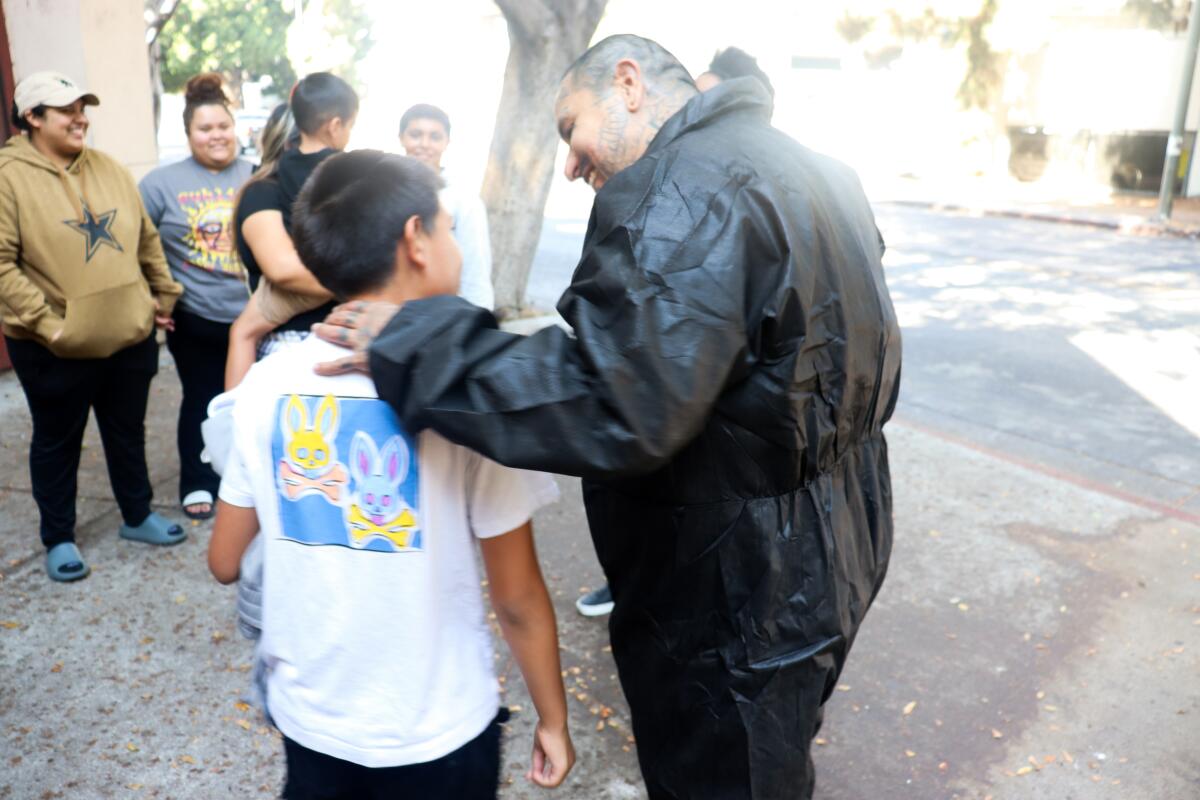
Findley said the hole in the wall had been made months before the incident, before Isiah and his mother had moved into the home.
Olivares’ conviction is not the first to come under question.
In 2002, then-18-year-old Zavion Johnson was convicted of killing his 4-month-old daughter, Nadia. Like Olivares, Johnson’s criminal case was based on expert medical testimony, although 13 witnesses had testified that Johnson had no history of abuse. In 2017, his conviction was reversed after experts repudiated some of their testimony.
In 2021, 45-year-old Clifton Jones was released from prison after his attorney argued that the medical opinion that had been widely accepted at the time of his conviction was now seen as false.
Jones had stated he was holding his son when he tripped over a shoe in his Sacramento home. Jones was unable to break his fall, and his son hit the back of his head against the wall.
In Texas, Robert Roberson is set to be executed Oct. 17 for the death of his daughter in 2002, but 86 Texas lawmakers are asking the Texas Board of Pardons and Paroles for clemency in the case. Roberson’s daughter was believed to have died of shaken baby syndrome, but a growing number of voices have argued against the conviction. Among those arguing for Roberson’s execution to be stopped is the lead detective in the case, who now believes Roberson’s daughter didn’t die from SBS.
The Northern California Innocence Project, or NCIP, since 2019 has been conducting a systematic review of SBS-related convictions going back decades, and has found many of them led to convictions based primarily on the opinions of medical experts, even though no other evidence pointed to abuse or violence, said Todd Fries, executive director of the NCIP.
On Friday, North Carolina executed Freddie Owens, even after serious doubts about his guilt emerged. When we kill the conceivably innocent, we become a mockery of ourselves and our supposed allegiance to justice.
The organization has identified 419 convictions in California involving SBS, he said. It is currently litigating five cases and reviewing about 40 others, he said, and it expects to assess several more.
The review has been a challenge. In SBS cases, he said, many of the defendants find themselves at a loss as to how to argue their innocence when their conviction was based on medical experts.
“Often in cases of junk science, people don’t know what went wrong in their case, and they don’t know how to challenge the case,” Fries said. “As a result, they’re hesitant to reach out.”
The review of cases has also highlighted a troubling pattern, he said. In about 77% of cases where the race of the defendant has been identified, he said, the accused was a person of color.
The organization is still reviewing the data, but the concern is that in many of the cases, doctors, social workers, police and prosecutors might be more inclined to suspect abuse in cases involving families of color, making minorities disproportionately targeted in SBS cases, with many of them built on shaky scientific grounds, Fries said.
Fries pointed to a 2021 study that found forensic pathologists were more likely to rule a death as a homicide, rather than an accident, when the child is Black compared with when the child is white.
“It tells me that certainly prosecutors, but also hospital staff, are really considering race when making the determination that abuse has occurred,” Fries said.
The bulk of the cases appear to have occurred in the 1980s and 1990s, he said, but the number of SBS cases going to trial seems to have significantly declined since. Legal experts believe that may be due to the change in medical consensus.
More to Read
Sign up for Essential California
The most important California stories and recommendations in your inbox every morning.
You may occasionally receive promotional content from the Los Angeles Times.
